Democratic Divide Deepens: New Rochelle School Board Election Reflects Party’s Ideological and Racial Tensions
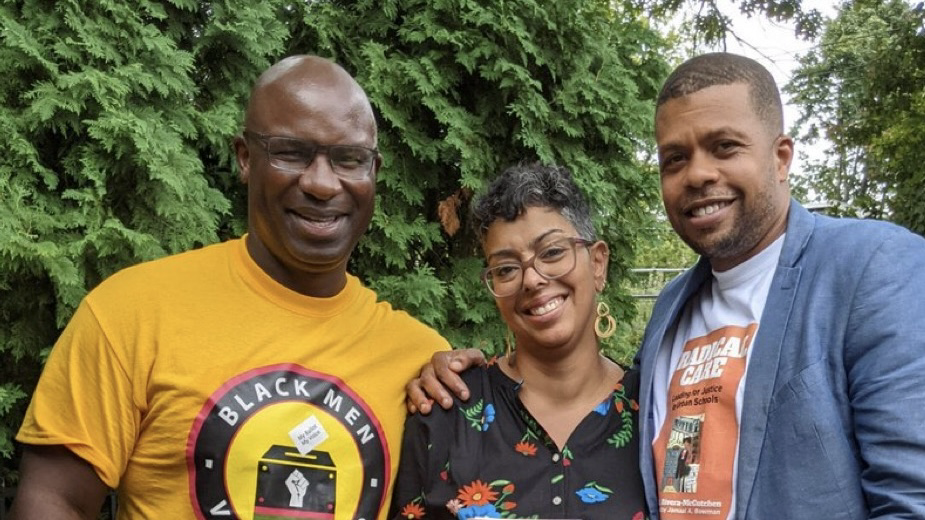
NEW ROCHELLE, NY (May 22, 2025) — The New Rochelle school board election on May 20, 2025, has emerged as a flashpoint in the ongoing “civil war” within the national Democratic Party, pitting its progressive wing against centrist Democrats and exposing racial tensions between Black and Jewish voters. The race, shaped by the fallout from the Hamas attacks on October 7, 2023, and the Gaza conflict, saw former Rep. Jamaal Bowman’s endorsement of a progressive candidate ignite a fierce response from the Jewish community, driving high voter turnout and a decisive victory for two Jewish candidates. This local school election has implications for Democrats from coast-to-coast.
The election for two seats on the New Rochelle Board of Education, overseeing a district of 9,700 students and a budget exceeding $360 million, featured five candidates: Elana Jacob, Jessica Klein, Dr. Rosa Rivera-McCutchen, Keith Singletary, and Myriam Decime. Jacob and Klein, both Jewish parents, campaigned on restoring balance to education, emphasizing core skills and respect. Rivera-McCutchen, a professor at CUNY with over 20 years in education, ran on a platform of “radical care,” equity, and support for marginalized students, particularly Black and “Latinx” communities. She was endorsed by Bowman, a national progressive figure known for his vocal support of Palestinian rights.
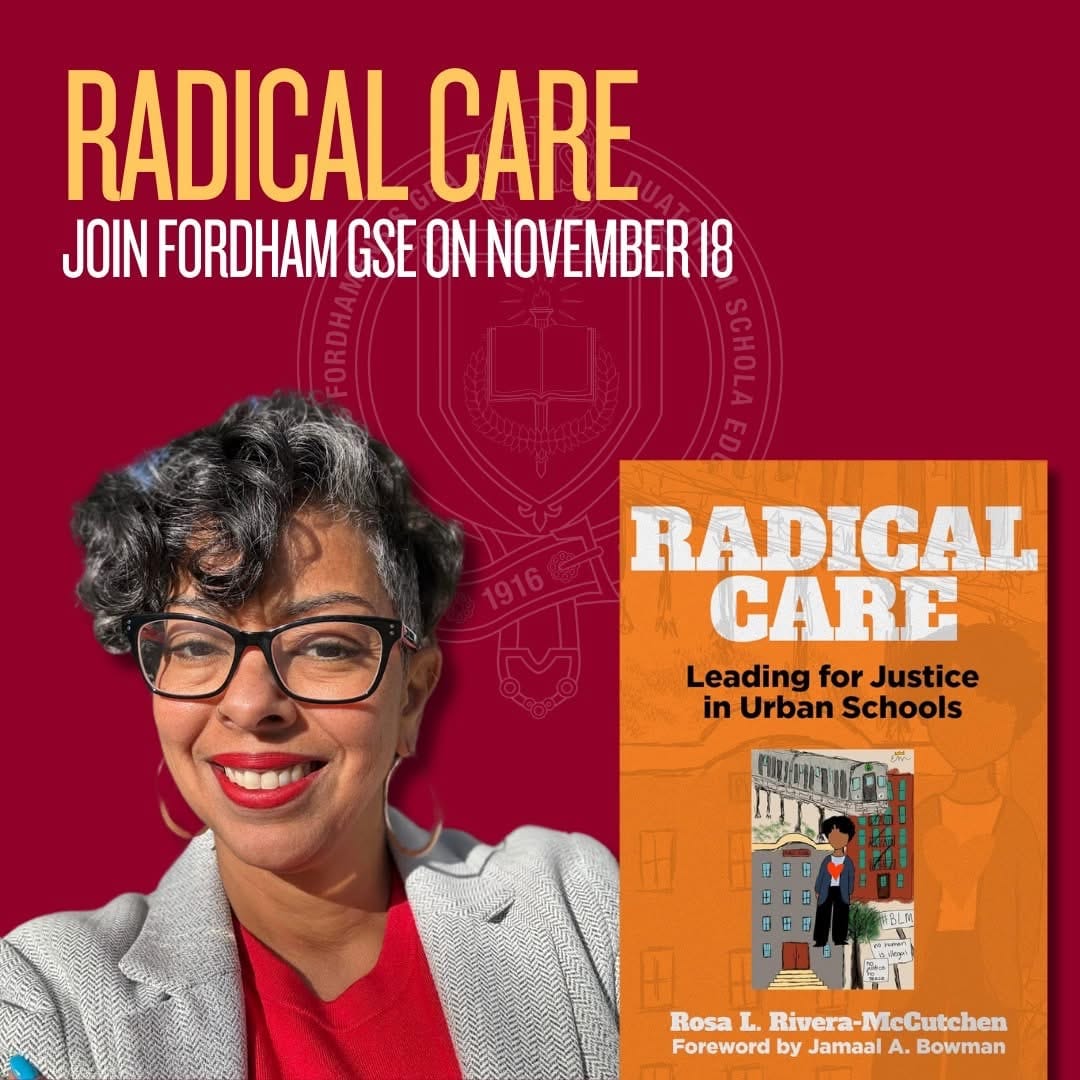
Bowman’s involvement in the race, including his endorsement of Rivera-McCutchen and his foreword to her 2021 book Radical Care: Leading for Justice in Urban Schools, became a lightning rod. His 2024 primary loss to centrist George Latimer in New York’s 16th Congressional District, heavily funded by the American Israel Public Affairs Committee (AIPAC) and driven by Jewish voter turnout, set the stage for the school board contest.
“Bowman didn’t fall because his opponents outspent him,” the Jewish Link wrote in a recent article. “He fell because our community turned out.” The publication urged Jewish voters in Westchester, including New Rochelle, to mobilize again, framing school boards as the new battleground against progressive activists.
The Jewish Link highlighted the broader stakes: “School boards set the tone for everything: what’s taught, how it’s taught, and whether bias—subtle or overt—is allowed to fester.” It noted that progressive networks, like the Democratic Socialists of America, view school boards as “soft targets” for advancing their agenda, a strategy outlined at the DSA’s 2023 convention to infiltrate local school systems with ideologically driven candidates.
In New Rochelle, Rivera-McCutchen’s campaign reflected this progressive push. Her platform prioritized equity, diversity, inclusion. “As a lifelong educator, I understand how important it is to have the resources I need so that I can give my students the best possible education,” she stated in campaign materials. Her advocacy extended to global issues, with social media posts on social media supporting a ceasefire in the Gaza conflict and student protests at institutions like CUNY. On May 7, 2024, she wrote on Facebook: “I disagree that my support of a permanent ceasefire in Gaza means that I don’t unequivocally demand the release of the hostages taken by Hamas. My positions on this issue do NOT make me antisemitic.”
However, her alignment with Bowman and groups like WESPAC, known for progressive and anti-Israel stances, drew sharp criticism from the Jewish community. Some voters perceived her views as anti-Israel, a sentiment amplified by Bowman’s endorsement. In an open letter to the New Rochelle community during the campaign, Rivera-McCutchen addressed these concerns: “I am NOT ‘anti-Israel’, as some have said. My opinions about global conflicts in general are frequently informed by an ethic of humanity and care, rather than a deep historical or political analysis.” She advocated for a two-state solution and dialogue, emphasizing that “advocating for the rights of Palestinians” does not equate to antisemitism or disregarding Israel’s existence.
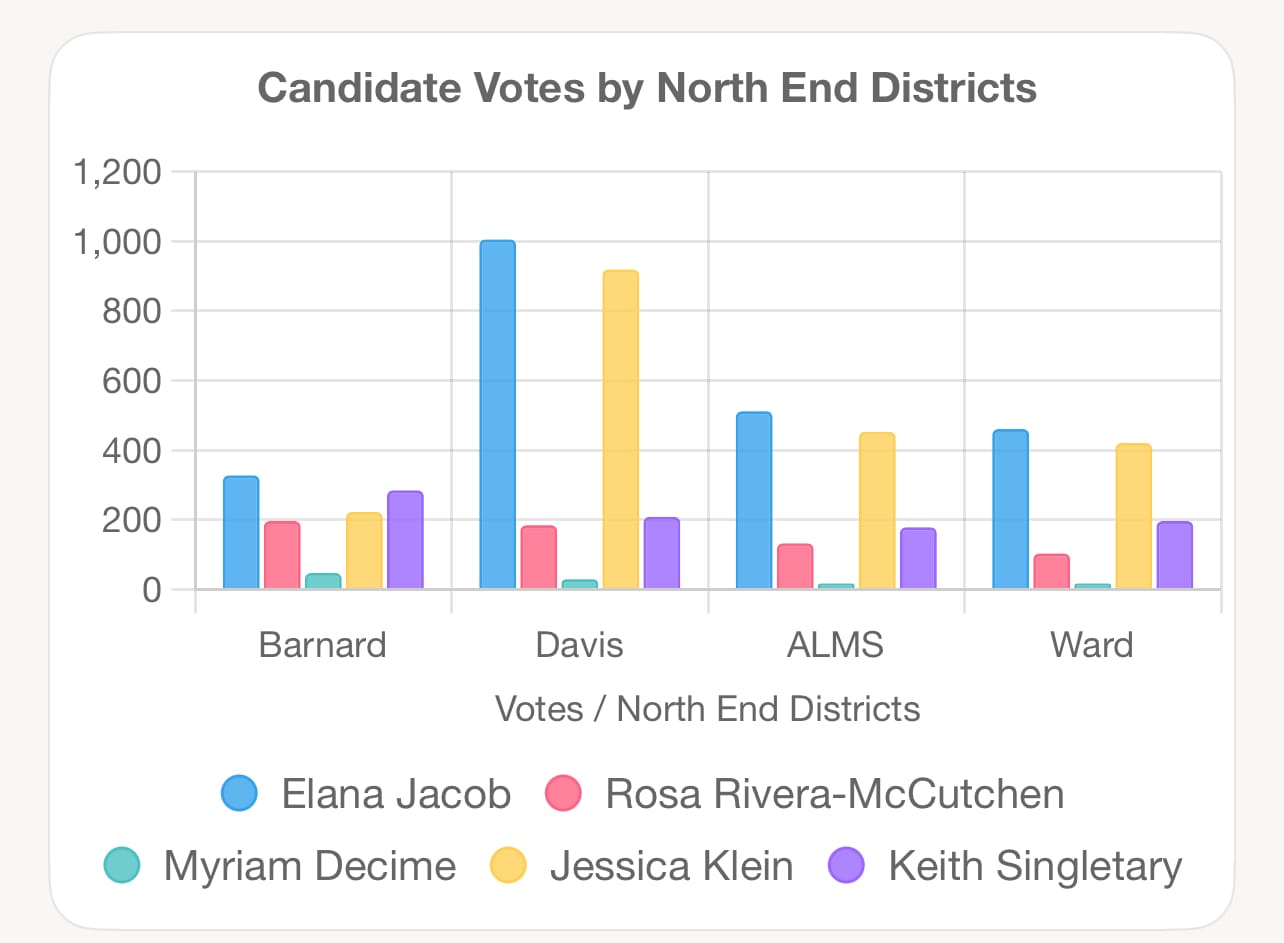
The election results underscored the Jewish community’s mobilization. In the four North End districts—Barnard, Davis, ALMS, and Ward—Jacob and Klein dominated, capturing 69.3% and 60.6% of their total votes, respectively. Jacob secured 2,306 votes and Klein 2,016, far outpacing Singletary (870), Rivera-McCutchen (619), and Decime (114) in these areas. Voter turnout in the North End was notably high, ranging from 16.2% in Barnard to 26.1% in Ward, averaging 21.7%, compared to just 5-6% in South districts and 6-8% in historically Black districts. Davis, with 1,130 total votes, was a stronghold for Jacob (1,005 votes) and Klein (919 votes), reflecting strong community engagement, likely made up of many Young Israel Scarsdale voters.

The budget vote in the North End also showed robust support, with 67.9% of the 2,934 votes favoring approval (1,993 Yes, 941 No). District 3 (Davis) had the highest vote count, with 66.3% Yes votes, while Barnard had the highest No vote share at 35.4%. The alignment of strong budget support with Jacob and Klein’s dominance suggests that voters favoring the budget also backed these candidates, though Singletary’s 285 votes in Barnard indicated some diversity in preferences.
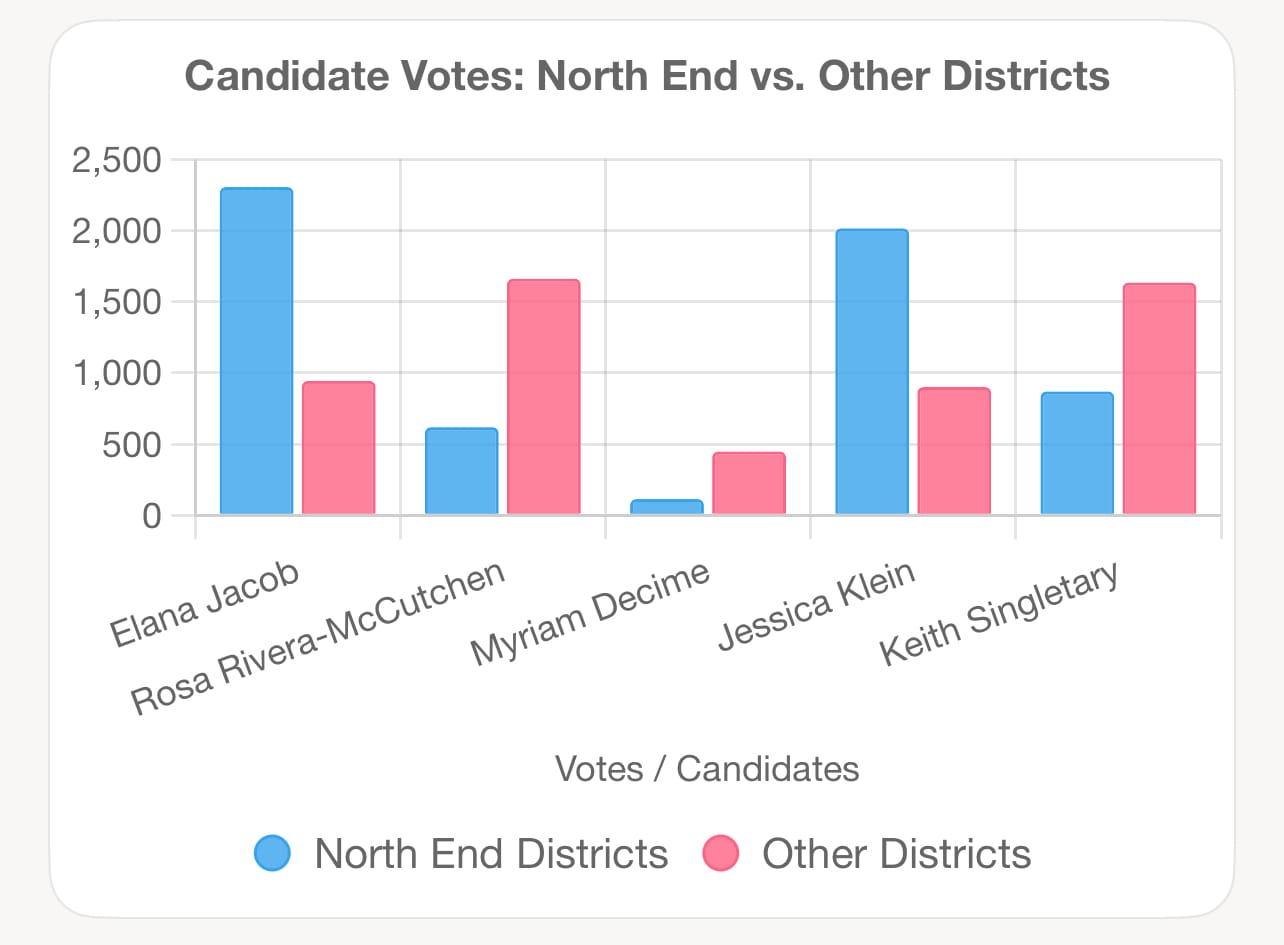
Rivera-McCutchen performed better in districts with lower voter turnout, but her limited support in the North End—619 votes across four districts—underscored her struggle to gain traction in Jewish-heavy areas. Myriam Decime, a lifelong New Rochelle resident and chemical engineer, garnered minimal support (114 votes), indicating she was not competitive. Keith Singletary, a CPA with financial expertise, had a notable showing in Barnard (285 votes) but trailed Jacob and Klein overall.
The high turnout and strong performance of Jacob and Klein in the North End reflect a galvanized Jewish vote, likely driven by opposition to Rivera-McCutchen’s perceived anti-Israel stance and Bowman’s involvement.
The Jewish Link warned that the same activist energy behind Bowman’s 2020 election was now targeting school boards, urging voters to act: “Your vote isn’t one in a million—it might be the one that tips the balance.”
Rivera-McCutchen’s post-election response (see below) revealed deep frustration, not with Jacob and Klein personally, but with what she described as a “coordinated attack” against her candidacy. “I am angry that some members of the New Rochelle community (and beyond) organized a coordinated attack against my candidacy for a school board—and Keith’s by association—because of my support for and relationship with Jamaal Bowman, and my support of human rights in Gaza,” she wrote. She cited an incident where Black women canvassing for her and Singletary were reported to police for alleged electioneering, calling it “at best, willful ignorance, and at worst, an act of violence.” She accused some progressives of weaponizing whiteness against the interests of children of color, stating, “We continue to embrace so-called progressives in our networks when they are unwilling to examine how they weaponize their whiteness to organize against the best interests of the children.”
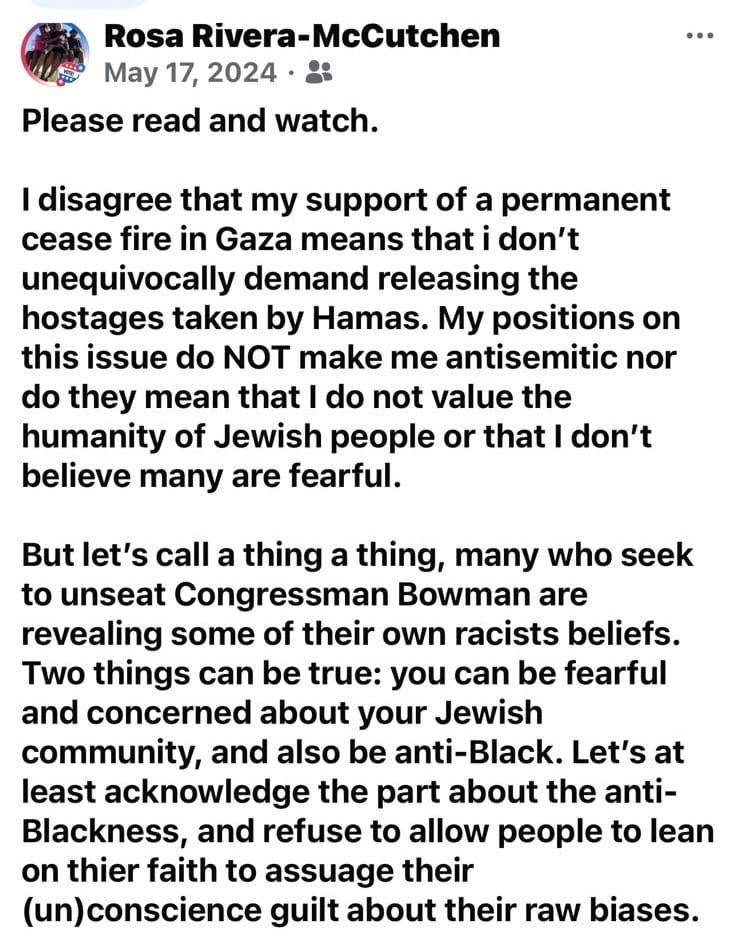
Her remarks highlight the racial dimension of the conflict, framing the Jewish community’s mobilization as anti-Black and racist. This underscores a broader divide within the Democratic Party, where non-White Democrats aligned with progressive causes like Palestinian rights clash with Jewish Democrats prioritizing Israel’s security and centrist policies. Rivera-McCutchen’s call to “leverage this loss as a way to energize” supporters suggests an intent to continue organizing, warning that such outcomes “can/will happen again and again if we don’t organize.”
The New Rochelle election mirrors broader Democratic Party tensions, intensified by the Gaza conflict. Bowman’s 2024 defeat, driven by AIPAC funding and Jewish voter turnout, set a precedent for local races. The Jewish Link noted that progressive networks like the Democratic Socialists of America target school boards as “soft targets” due to their low turnout, often decided by a few hundred votes. In New Rochelle, the Jewish vote proved decisive, echoing the dynamics that ousted Bowman. Rivera-McCutchen’s alignment with progressive causes, including her support for a Gaza ceasefire and campus protests, positioned her as a target for centrist and Jewish opposition.
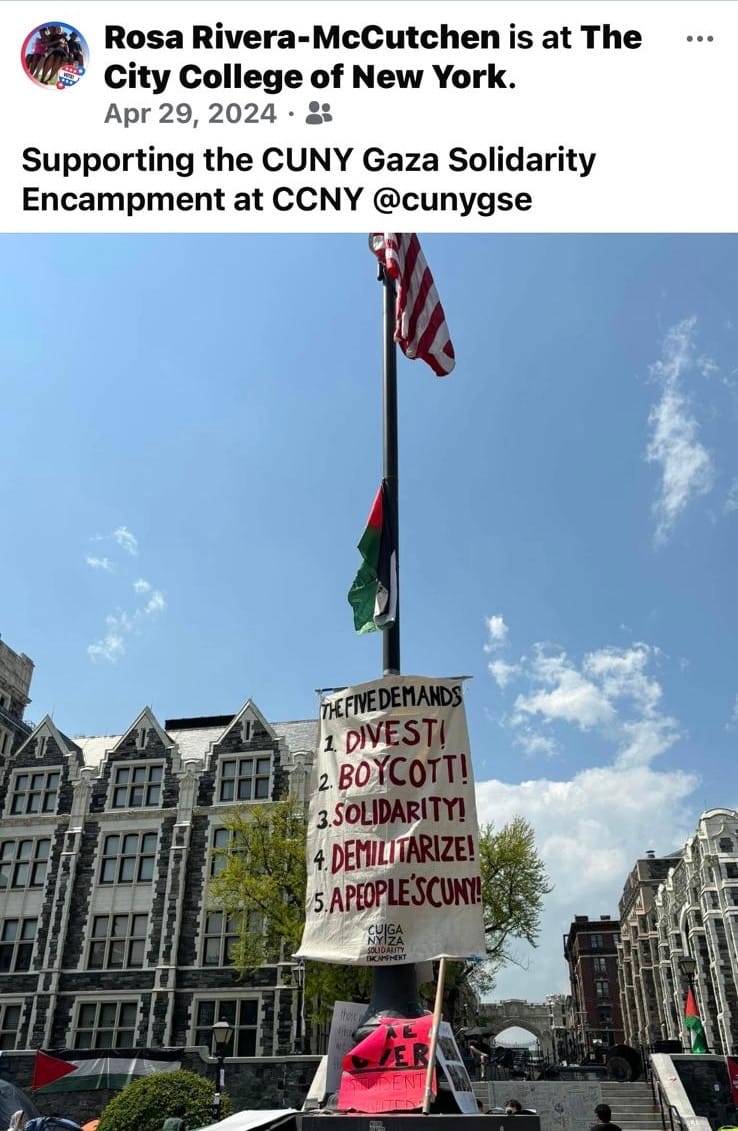
The election also reflects the Democratic Party’s struggle to reconcile its progressive and centrist wings. Rivera-McCutchen’s advocacy for equity and radical care resonates with Black and Latinx communities, as seen in her April 25, 2025, X post: “EW allies don’t hold the answers to the needs of students of color. It should be educated, white allies who lift up the voices of #BIPOC.” Yet, her progressive stance and Bowman’s endorsement appear to have alienated voters wary of ideological activism in schools. Jacob and Klein’s victory signals a preference for moderation, aligning with centrist Democrats who prioritize balanced education over progressive agendas.
The racial tensions highlighted by Rivera-McCutchen—particularly her accusation of anti-Blackness in the opposition—point to a deeper demographic divide. Her identity as a “DACA scholar” and mother of “Afro-Latinx children” informed her advocacy for marginalized students, but her focus on global issues like Gaza may have distanced voters focused on local concerns. The Jewish Link emphasized the need for Jewish voters to remain vigilant, noting that “the activists who filled [Bowman’s] rallies are now aiming for school board seats.”
I had the honor of writing the forward for this amazing book entitled Radical Care written by my mentor and scholar Dr. Rosa Rivera-Mccutchen.
— Jamaal Bowman Ed.D. (@JamaalBowmanNY) August 30, 2021
The book is for school leaders but Radical care is what the world needs now more than ever. Let us take this healing journey together. pic.twitter.com/CUI3YDh2aX
Rosa Rivera-McCutchen’s campaign for a school board seat was marked by a palpable sense of entitlement, as though her candidacy warranted automatic support, regardless of her performance or appeal. In the wake of her loss, Rivera-McCutchen has been quick to cry racism, framing her defeat as a product of systemic bias rather than a reflection of her own shortcomings. Yet, her narrative conveniently sidesteps a critical fact: another Black candidate, Singletary, outperformed her in the race, securing a stronger position among voters. The only candidate Rivera-McCutchen outpaced was Myriam Decime, a vanity candidate whose campaign was widely regarded as non-serious. Among the four competitive candidates, Rivera-McCutchen finished dead last—a result she seems unwilling to attribute to her own lack of likability or strategic missteps.
This sense of entitlement shines through in Rivera-McCutchen’s post-election letter, a document dripping with anger and vitriol. Far from the measured, gracious response one might expect from a seasoned candidate, the letter reads as a bitter tirade, lashing out at voters and attributing her loss to external forces rather than any personal or campaign failings. It’s the kind of public outburst that underscores a fundamental disconnect: Rivera-McCutchen seems unaware that her approach—marked by divisiveness and an inability to connect with voters—may have been a significant factor in her defeat. For someone aspiring to public office, the letter is a masterclass in how not to handle electoral disappointment.
Central to Rivera-McCutchen’s narrative is her indignation over the fallout from her endorsement by former Congressman Jamaal Bowman in the NY-16 race. During her campaign, Rivera-McCutchen actively sought and celebrated Bowman’s support, proudly featuring his foreword in her book and leveraging his name for credibility. Yet, when voters reacted negatively to this association—likely due to Bowman’s polarizing tenure and his loss to George Latimer—she pivoted, casting any criticism of her Bowman ties as unfair or even racist. This is a baffling contradiction: Rivera-McCutchen eagerly courted Bowman’s endorsement, fully aware of the potential backlash given his controversial record, yet now frames any pushback as evidence of bias or racial enmity rather than a legitimate response to her political choices.
Rivera-McCutchen’s campaign was unique in its overt injection of political ideology into what is supposed to be a nonpartisan school board race. While the other three substantive candidates—Singletary included—focused on issues like education policy and community needs, Rivera-McCutchen leaned heavily into ideological rhetoric, a choice that likely alienated voters seeking pragmatic leadership. She made a calculated gamble that Bowman’s endorsement would galvanize her base, but failed to anticipate the broader electorate’s reluctance to import divisive national politics into local governance. When voters rejected this approach, Rivera-McCutchen didn’t reflect on her miscalculation; instead, she doubled down, accusing her detractors of bad faith.
The irony is stark: Rivera-McCutchen’s accusations of racism ring hollow when Singletary, a Black candidate, outperformed her without leaning on the same ideological crutches. Perhaps the issue isn’t race but Rivera-McCutchen’s own unlikability or her misreading of the electorate’s priorities. Her campaign’s focus on divisive politics, coupled with her bitter post-election rhetoric, suggests a candidate more interested in assigning blame than building bridges. In the end, Rivera-McCutchen’s loss may have less to do with systemic bias and more to do with a simple truth: voters didn’t find her compelling.
The New Rochelle election underscores the Democratic Party’s ongoing “civil war,” with progressives like Rivera-McCutchen and Bowman advocating for radical equity and Palestinian rights, while centrists and Jewish Democrats push for moderation and pro-Israel policies. The high Jewish voter turnout and decisive win for Jacob and Klein suggest that the Gaza conflict and Bowman’s influence have activated Jewish voters to counter progressive gains in local politics. As Rivera-McCutchen noted, the “absurdity of the final numbers reveals a lot about the underlying motivations of the opposition,” pointing to a polarized electorate.
The election’s outcome has broader implications for the Democratic Party. Progressive strategies to capture local power, as outlined by the Democratic Socialists of America, face significant resistance in areas with organized centrist and Jewish voters. The racial and ideological divides exposed in New Rochelle suggest that reconciling these factions will be a challenge as the party navigates future elections.
RELATED:
Jewish Link: School Boards Are the New Battleground: Why the NY Jewish Community Must Vote on May 20
Rosa4NewRo.com: Open Letter to the New Rochelle Community
Rosa Rivera-McCutchen Post Election Statement:
FB Fam far and near:
First, I am profoundly grateful to you for your support & energy for my run. Whether you texted/called me, had a lawn sign, canvassed, phone-banked, or donated money and/or your services, I appreciate every one of you. Thank you.
After sleeping in and then tackling a VERY long to-do list of things that have completely fallen off of my radar (I have no clean clothes left!), I've also been texting and talking with a few people throughout the day. I'll start by noting that my reflections below are not about Elana Jacob and Jessica Klein, individually. I had the opportunity to speak with both of them during the campaign, and they seem kind and committed. They promised throughout the campaign that they were concerned about "achievement gaps" and that they would attend to the needs of students of color and other marginalized students. I plan to hold them accountable and you should, too.
I am not surprised nor am I feeling sad for myself. But, I am angry for New Rochelle, and most especially for the communities of color that comprise the majority of our student population. I am angry that some members of the New Rochelle community (and beyond) organized a coordinated attack against my candidacy for a school board--and Keith's by association--because of my support for and relationship with Jamaal Bowman, and my support of human rights in Gaza (Links to these articles in the comments). I am angry that a person campaigning for the north end candidates called 911 on Black women canvassing for Keith & me at the high school accusing them (wrongfully!) of electioneering within the 100ft boundary. Calling 911 on a person of color for something like that is, at best, willful ignorance, and at worst, an act of violence.
And I am especially angry that we continue to embrace so-called progressives in our networks when they are unwilling to examine how they weaponize their whiteness to organize against the best interests of the children (i.e. electing the most qualified candidates) who attend our schools. We need to call that shit out! Don't give those people a pass. They want to be adjacent to Black & Brown people, but won't authentically show up for Black & Brown people. As Maya Angelou said, "when someone shows you who they are, believe them the first time."
Some of you who supported me may bristle at my alluding to the racial elephant in the room, but it is there. And as I've been saying over the last few weeks, we need to talk about the hard things!
But this anger is also incredibly energizing! The absurdity of the final numbers reveals a lot about the underlying motivations of the opposition, and people who were not aware of the attacks I endured are baffled and scratching their heads in confusion. We need to leverage this loss as a way to energize those people to engage; explain what happened and how it can/will happen again and again if we don't organize. We also learned a few things about the strategies the opposition used that we need to adopt and adapt. And we need to start this work NOW!
Last, I know that we are disappointed that people didn't turn out to vote, and that's fair. But there are a multitude of reasons why people are not engaged. Chastising hasn't helped; we need to adopt a learning stance and understand not just why they're not engaged, but also how we can help (re)engage them.
If this race catalyzes the movement we need, I will consider it won.
With profound gratitude,
Rosa
This article was drafted with the aid of Grok, an AI tool by xAI, under the direction and editing of Robert Cox to ensure accuracy and adherence to journalistic standards.





